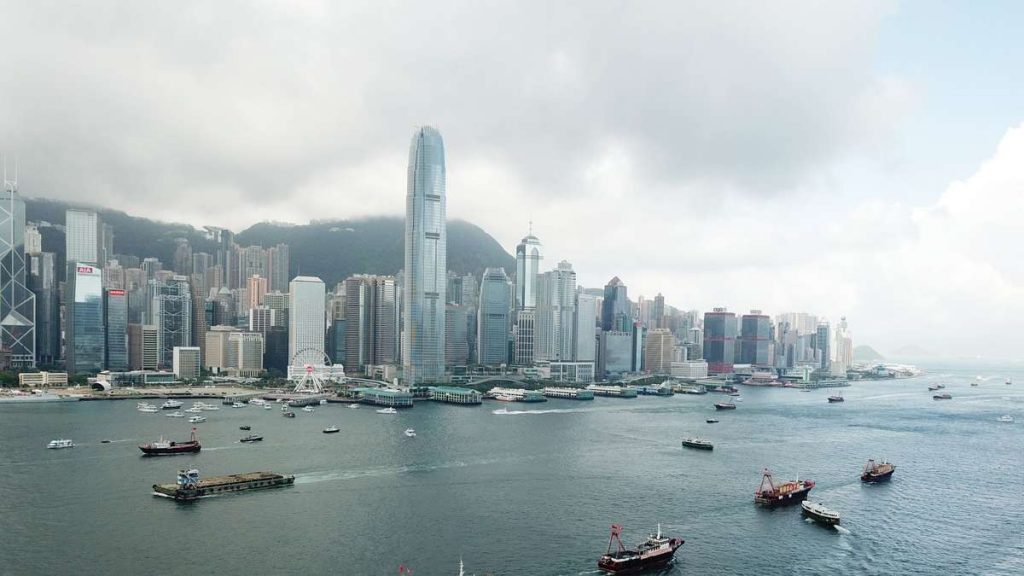updated:
-
NSChristian Cole
Close
China wants to extend its anti-sanctions law to Hong Kong and Macao. Companies and Experts Are Concerned: Is the Free State of the Economic City in Danger? Hong Kong officials appease
BEIJING/HONG KONG/MUNICH – China also wants to tie Hong Kong and Macau closely to Beijing’s rules on economic policy as well. The government now wants to extend the anti-sanctions law passed in June to the two special administrative regions. The law in mainland China prohibits companies and individuals from imposing foreign sanctions on Chinese companies. Instead, they should cooperate with China’s counter-defense against these punitive measures. This also applies to foreign companies and expatriates from all over the world who live in China – and soon it also appears in Hong Kong or Macau. Companies that do not follow the relevant instructions face penalties under the law – such as freezing accounts and assets. Foreigners can lose their visas and be expelled.
The Standing Committee of China’s National People’s Congress is deliberating behind closed doors for several days this week in Beijing. It is also a matter of adding an appendix conforming to the basic laws of Hong Kong and Macau. A decision is expected on Friday, Hong Kong media reported. Next, local parliaments have to pour the law into local law.
China: Companies caught between the sanctions fronts – now also in Hong Kong
Experts see the law primarily as a deterrent – to prevent the United States or Europe from imposing further sanctions against China. Steve Tsang, director of the China Institute at University College London’s School of Oriental and African Studies, believes the law will be enforced when Hong Kong faces new foreign sanctions. He told the Hong Kong newspaper that it is actually a political gesture against the United States and other countries South China Morning Newspaper. So far there are no concrete cases in China.
However, Hong Kong’s international companies and financial institutions fear being caught between political fronts in the current disputes between China, the United States and Europe. The dilemma already discussed among managers in China in June is that some companies can only violate laws and sanctions rules both in China and abroad. They have to pick one — or rearrange their business accordingly so that it is legal everywhere. This makes doing business more complicated than it is in China anyway.
In Hong Kong, the financial sector can be particularly affected, as there are many foreign banks there. As a general rule, US banks have to implement Washington’s sanctions directly – whether it is against Iran or Hong Kong Prime Minister Carrie Lam. Because of US sanctions, she could no longer have a bank account with international banks and complained of having “piles of cash” at home. The new law could force foreign banks in Hong Kong to allow Lam’s company to open accounts again – in violation of US law.
Hong Kong: Anti-penalty law enforcement remains open
But so far it has not been clear how strict Hong Kong’s law enforcement will be – and when. Local authorities are trying to calm nerves and indicated that Parliament will no longer deal with the transition to local law during this legislative period. . books South China Morning Newspaper Citing unnamed government informed sources.
In general, there is concern that Hong Kong’s special status as a free Asian economic and financial city could be further undermined. The city’s image is already suffering from a draconian security law passed in June 2020, under which dozens of government opponents have been arrested. The electoral system was also changed at the request of Beijing. This makes it difficult for the opposition to enter the Legislative Council and the local parliament.
China with US and EU in dispute over Hong Kong and Xinjiang sanctions
The United States has imposed sanctions on Hong Kong politicians since the security law was passed, including Prime Minister Carrie Lam and Beijing Liaison Office Director Luo Huining, as well as several former ministers and police chiefs. In the spring, the European Union and the United States also imposed sanctions on ways to deal with the Muslim Uyghur minority in northwest China’s Xinjiang. Beijing immediately responded with counter-sanctions. Under the tense geopolitical situation, the widening of the sanctions dispute cannot be ruled out.
The US government warned multinational companies of new risks in Hong Kong last July. There has been talk of “operational, financial, legal and reputational risks” from the Security Act and other legislative changes. The Chinese leadership and loyal Hong Kong government “undermine the necessary legal and regulatory environment for individuals and businesses to operate freely and with legal certainty in Hong Kong.” (ck with dpa)
.

“Tv expert. Hardcore creator. Extreme music fan. Lifelong twitter geek. Certified travel enthusiast. Baconaholic. Pop culture nerd. Reader. Freelance student.”






More Stories
USA: It is clear that the economy is losing momentum at the beginning of the year
Chocolate storm in Türkiye – the Swiss are confused
Big Topics at New UBS's First General Meeting – News